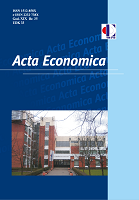MACROECONOMIC DETERMINANTS OF INVESTMENT IN THE BALKAN COUNTRIES
MACROECONOMIC DETERMINANTS OF INVESTMENT IN THE BALKAN COUNTRIES
Author(s): Jelena Bjelić, Ognjen Erić, Slaviša KovačevićSubject(s): Business Economy / Management, Economic history, International relations/trade, Economic development, Transformation Period (1990 - 2010), Present Times (2010 - today)
Published by: Економски факултет Универзитета у Бањој Луци
Keywords: investment; gross savings; indebtedness; GDP; FDI; interest rate; the Balkans;
Summary/Abstract: This study analyzes the impact of crucial macroeconomic variables on investments for six selected Balkan countries (Croatia, Serbia, Bosnia and Herzegovina, Montenegro, North Macedonia and Albania) in the period from 2005 to 2020. Most of these countries are on the path to European integration, and Croatia has been a member of the EU since 2013. Their development and macroeconomic goals are mostly identical, and one of the main is the requirement of a high level of investment in order to achieve higher growth rates and overcome the development gap in relation to EU countries. The research starts from the hypothesis that the selected factors (independent variables): gross savings, FDI, interest rate, GDP growth and external debt, affect the total investments in the region. To prove this hypothesis, a panel analysis model was applied, that is the panel with a fixed effect as a more relevant model for estimation. The results show that savings and external debt are significant variables, whereby savings have a positive impact on investment, while the impact of public debt is negative. Real interest rates also determine investment, which is shown by their marginal significance and negative numbers. In other words, higher interest rates discourage investment. Finally, the analysis shows that GDP growth is not significant, but the direction is logical and slightly encourages investment. Foreign investments are also an insignificant variable, but they have a positive direction, which explains why the deficit of domestic investments is only partially compensated through the FDI.
Journal: Acta Economica
- Issue Year: 19/2021
- Issue No: 35
- Page Range: 19-33
- Page Count: 15
- Language: English

